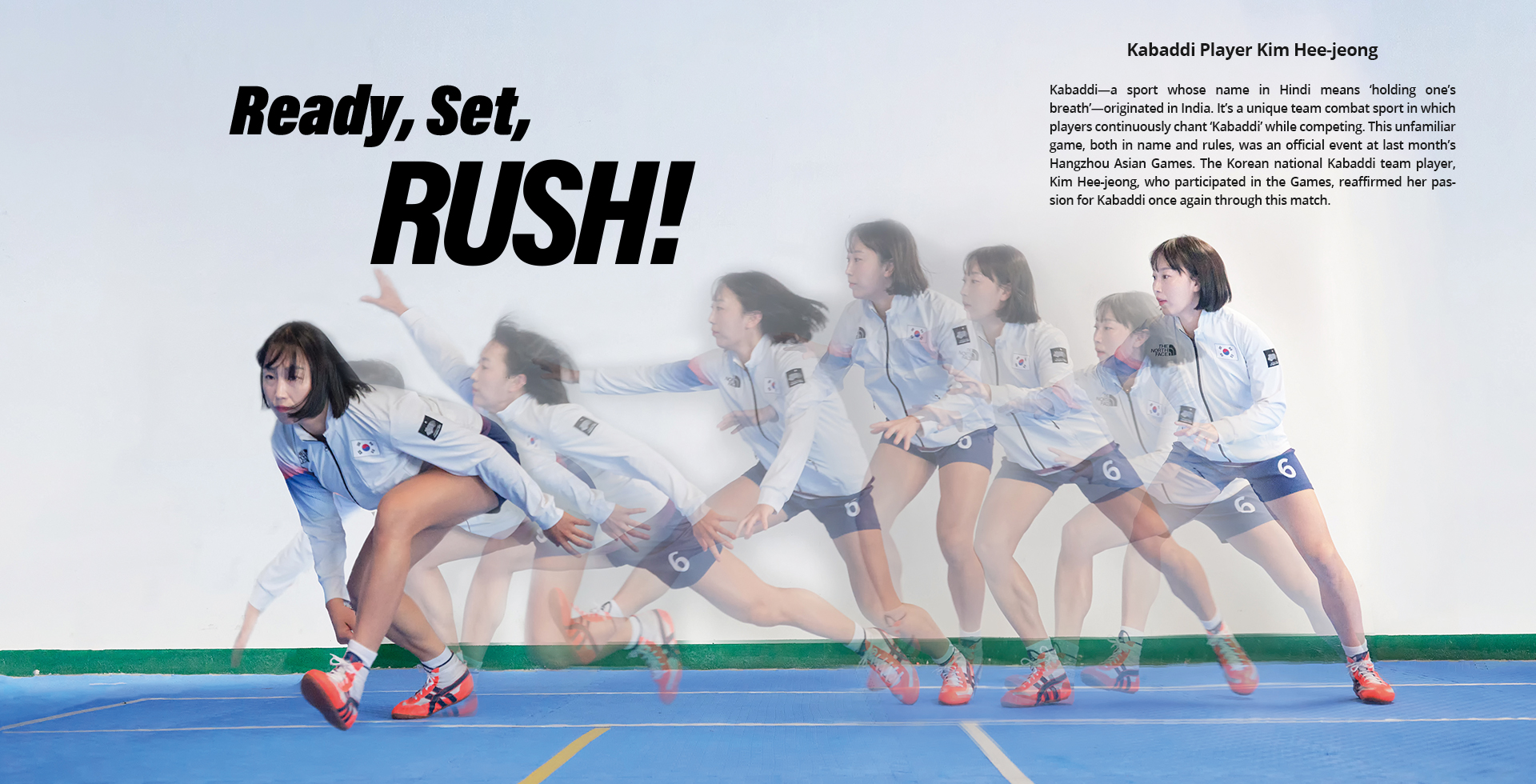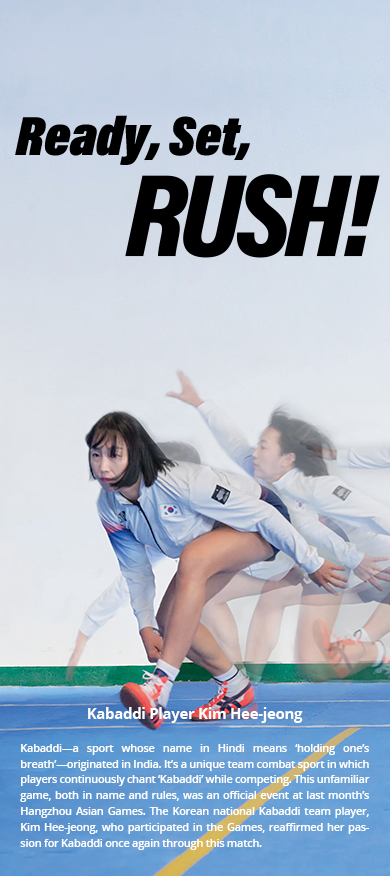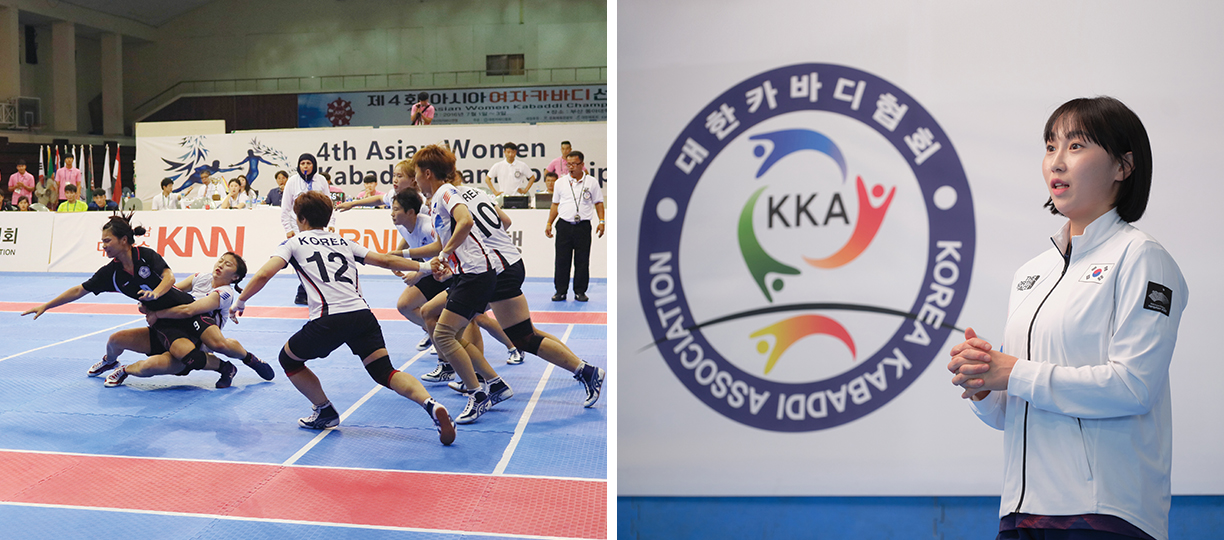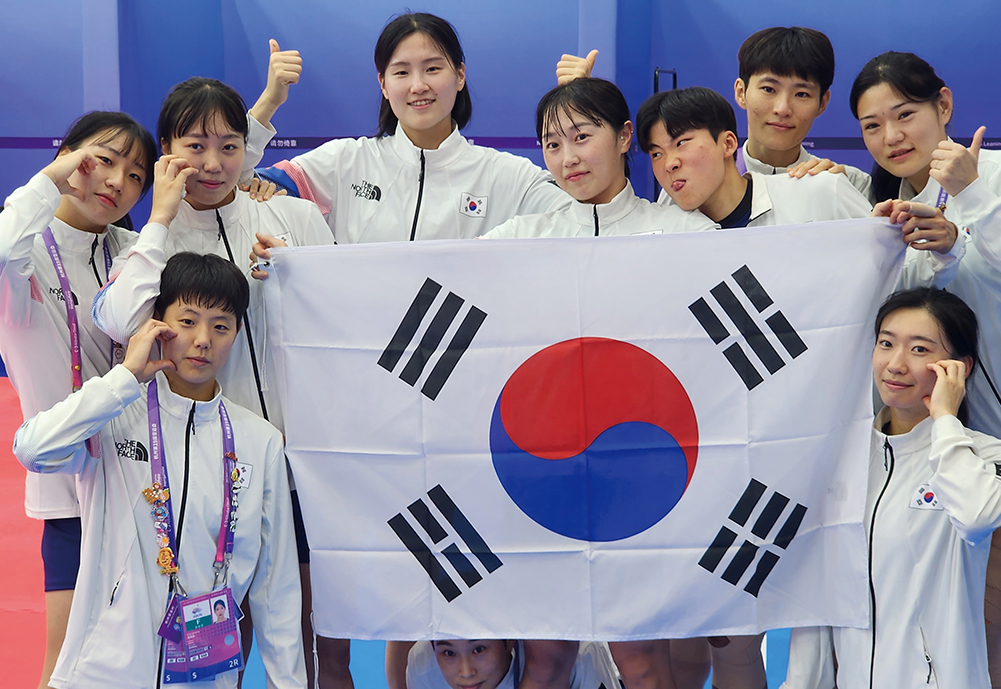November 2023

K-sports


Q. What is Kabaddi?
Kabaddi―a team combat sport comprising 14 players, with 7 on each side―features an attacking team and a defending team. An attacker crosses into the defending side, touches a defender and returns to their side to earn points equal to the number of defenders touched. If defenders catch the attacker before they return, the defending team scores. For each touch by an attacker, they earn one point, and defenders earn one point for stopping an attacker. However, if the attacker fails to touch someone, they are considered “out.” When all defenders on the defending team are out, it’s called a “lona,” and the attacking team receives an additional 2 points. Once the attackers cross over to the defending side and return home, the roles switch. It seems like an individual sport when attacking and a team sport when defending.
Q. How is victory determined?
The team boasting the most extensive cumulative score emerges as the victor―there are no limits on the number of games or the score. The game is split into halves, each spanning 15 minutes, with a 5-minute halftime―apart from halftime, teams alternate between attack and defense according to their positions.
Q. Can you tell us some techniques?
In the attack, there are techniques like “hand touch,” where the attacker uses their hand to touch the opponent and “toe touch,” where the attacker stretches their leg to touch. In defense, there’s the “ankle catch,” where defenders grab the attacker’s ankle. Defenders can also join hands to form a chain and catch the attacker, a move called “chain hold.” This technique can be done in different numbers such as two defenders attacking together. The “struggle”―a skill where the attacker tries to break through multiple defenders; if the defenders successfully block it, they gain 1 point. If the attacker breaks through the defenders and returns to home, they score points based on the number of defenders they touch.
Q. Kabaddi is not widely known in Korea. How did you get to know it and become a player?
I used to be an athlete in track and field and volleyball. Naturally, I entered a physical education university and crossed paths with a friend who happened to be a Kabaddi player.
The friend suggested we try a game together. In my inaugural match, essentially a trial run, we clinched second place. This outcome left me with a strong belief that with a bit more effort, we could secure the first place, so I played again and took first place. With consecutive good results, I started aiming for the national team and began my Kabaddi journey in earnest, ultimately becoming a national team player after serving as a backup national athlete.
 © Korean Kabaddi Association
© Korean Kabaddi Association Q. What makes Kabaddi so enjoyable for you?
Kabaddi is often compared to other sports like wrestling or tag―it’s notably different. It’s thrilling and sometimes intense. Even just watching it is fun, and playing it is even more enjoyable. The fast-paced nature of the game means you lose track of time when you’re fully focused. You don’t even notice the score or whether you’re winning or losing. The sensation of touching an opponent in a split second―using tactics to deceive the opponent and score―and the moments when you use both your body and mind are full of excitement and satisfaction.
Q. It seems that Kabaddi isn’t just about having good physical fitness.
That’s correct. Factors like height, weight and physical conditions are important, but agility, reflexes and stamina are crucial. Agility is necessary to react quickly to an opponent’s sudden movements, and fast reflexes are vital for explosive strength to break through opponents. Given the high-intensity nature of the game, stamina also plays an indispensable role.
Q. What are your strengths?
I’m speedy. Among Kabaddi players, I’m on the shorter and lighter compared to players from other countries. Although having a petite physique could be perceived as a drawback, I turned it into an advantage. Moreover, my prior experience in track and field has endowed me with superior speed compared to the majority of my peers.
Q. How do you train?
I train five days a week, with sessions in the early morning, late morning and afternoon. Each session lasts 1 to 2 hours. We focus on building endurance through hill running, carrying weight while running and circuit training. We practice Kabaddi skills and prepare for actual matches by playing games with other players.
 © Korean Kabaddi Association
© Korean Kabaddi Association Q. You participated in the Hangzhou Asian Games What are your thoughts on the experience?
The Asian Games were postponed for a year, which was a crucial matter for Korean Kabaddi players. In Korea, Kabaddi is not a professional sport, and players hold down other jobs to make a living. So, the delay was a bit bewildering, but we refocused on our goals. The women’s team had never won a medal at the Asian Games, so we trained hard with the aim of changing that history. Personally, I took on the role of team captain for the first time, which came with added responsibilities. Although the results were a bit disappointing this time, I have no regrets because we prepared diligently. Instead, it has further motivated me.
Q. What does Kabaddi mean to you?
I’ve been playing Kabaddi for 11 years. Kabaddi is a basic for me like food, clothing and shelter―something so natural that it’s become a part of me. Playing Kabaddi makes me happy. The more I play, the more passionate I become about it. When I compete in international events and play matches, I can’t wait to play again the next day.
Q. Do you have any goals in Kabaddi?
Next year, there’s an Asian Indoor and Martial Arts Games in March. I want to achieve good results there.
I aim to become a “player who helps the team.” Kabaddi is not a sport where a single player can shine in isolation, so I want to be the one who bolsters the team. Also, there’s no women’s professional Kabaddi league in India, the birthplace of Kabaddi. However, there are talks of one being established in the near future―if that happens, I’d like to play in the Indian pro league.
Finally, I hope that Korean Kabaddi continues to grow. One day, my teammate said, “I want people to react with ‘Wow!’ when they hear about Kabaddi, not “What’s that?” I feel the same way. The day I receive that kind of reaction will be the most moving moment in my sports career.
 View of all
View of all






